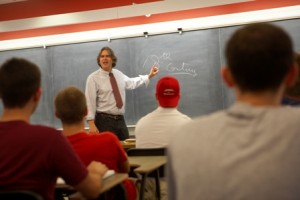
Professor D.C. Jackson teaches a class in Ramer History House.
D.C. Jackson, professor of history, will appear as an on-camera expert on the PBS American Experience program “Grand Coulee Dam.” The segment is scheduled to air nationwide 8 p.m. Tuesday, April 3.
Watch the preview
Jackson, an expert on the history of water resources, was interviewed in New York City by a crew from Insignia Films last fall for the 90-minute documentary. The segment highlights the origins of the project in the 1920s as well as the innovative technologies used during construction. The film also features the men and women who lived and worked at Grand Coulee in the midst of the Great Depression, and the native people whose lives were forever changed as the dam’s rising reservoir obliterated their ancestral homeland.
One of many public works projects built under President Franklin Roosevelt’s New Deal, the dam is the largest hydro-electric dam in the U.S. and at one time was the largest in the world, says Jackson, who has also appeared as an expert about dams on the History Channel program Modern Marvels and in an episode of the five-part PBS miniseries Building Big.
The electricity generated by the dam was used to make huge quantities of aluminum during World War II, and it was seen by many Americans as a symbol of the resilience of the American people in enduring hard times.
In addition to offering a historical perspective on Grand Coulee, Jackson provided Insignia Films with a rare photograph from his private archives of Franklin and Eleanor Roosevelt during a visit to the dam.
“She wasn’t that impressed with the early stages of the dam, but her husband reveled in his association with the project. Later the reservoir was named Franklin D. Roosevelt Lake in his honor,” Jackson says.
“In the film, I provide context for dam-building in American history and I also offer commentary on issues involving the dam’s construction,” he says. “There were many top scholars from the Pacific Northwest who made contributions to the film and I was honored to be included in their company.”
The dam originally generated 2 million kilowatts of electricity, more than enough to power the cities of Portland and Seattle combined (in the 1970s the power capacity was enlarged to 6 million KW). The film explores how the tension between technological achievement and environmental impact hangs over the project’s legacy.
“For all the wonders that are brought by electricity, there is always a price to be paid, and Grand Coulee is a great project in which to explore that dialectic,” Jackson says.
Last year, Jackson delivered the keynote address at the Hoover Dam 75th Anniversary Celebration in Las Vegas, Nev. In 2010 he also received the Overseas Prize, an international honor from the Institution of Civil Engineering, given for his article “Structural Art: John S. Eastwood and the Multiple Arch Dam,” published in the August 2009 Proceedings of the ICE – Engineering History and Heritage. He is co-author (with David Billington of Princeton University) of the 2006 book Big Dams of the New Deal Era published by the University of Oklahoma Press.

3 Comments
DC
I just watched the PBS show on Grand Coulee Dam. You did a great job. I told my wife, Joanne, “Hey, I know that guy.” It was a great show and you added much to it. It is good to see that you are still doing all of these great things. Important to me, you added much substance and levity to the work of the NRC Colorado River Basin Water Management committee a few years back. Keep up the good work. I would like to get your email address and know more of what you are doing now.
Take care, Ernie Smerdon (ejsmerdon@yahoo.com)
Dams, Bridges, Highways and Canals, these are the engines of Progress in The West! It is great that Lafayette has a close connection to this history. I have lived in Oregon since 1985 and am familiar with the lower dam system on the Columbia River. Just uphill on the Oregon side of the Columbia is the privately funded highway that was built in the 1920s. An engineering and scenic marvel, this highway is being rebuilt for bicycle traffic.
John:
Thanks for your message. I think you will enjoy the show on Grand Coulee Dam – it highlights the many benefits brought by the dam but also does not neglect the cost incurred in terms of migrating fish and the inundation of Indian lands and fishing sites at Kettle Falls.
I have experienced a bit of the Columbia River Highway in the section near Portland and it is indeed a spectacular resource. It’s great to hear that you are involved in helping to keep it alive as a biking trail.
All the best,
DC Jackson
Comments are closed.